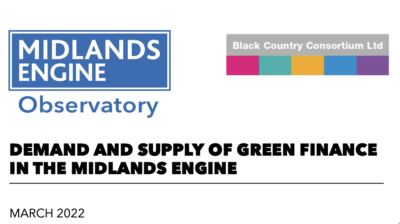
Transport
Apr 25 2024
Birmingham Airport (BHX) has achieved Level 3 (optimisation) of the Airport Carbon Accreditation (ACA) scheme for a second year.
Read more
A new report from the Midlands Engine Observatory looks at what green finance is already available, and what might be needed in the future.
Through interviewing innovation leads, business relationship managers, fund managers, and officers at regional Growth Hubs and LEPS, the report shows that many businesses are aware of the Net Zero agenda. An increasing number of businesses are seeking to invest in green technologies, but levels of investment remain low. Findings of the report include:
The Midlands Engine has many businesses and researchers working in green energy and low carbon technologies. However, some of our region’s traditional sectors, such as textiles or automotives, are still carbon intensive. The Midlands’ weaker economic performance of makes it harder for businesses to decarbonise.
Green finance is still a new area of finance and is difficult to categorise. Consequently, it is difficult to estimate how much green finance is available for the region.
A lot of the funding available is to support novel technologies. However, many technologies have already been proven, and therefore not eligible for support. There needs to be better support to help commercialise green technologies.
The region’s infrastructure is currently able to support Net Zero targets. There is little research on what changes to our national and regional infrastructure are required, and there is also very little finance available to support infrastructure developments. Infrastructure has the most potential to reduce (and capture) carbon emissions in line with the Net Zero targets.
Local authorities have a role to play in supporting green finance. This may include issuing green bonds. Local authority climate green bonds could raise as much as £3 billion, but not local authorities in the Midlands are involved in this.
Further research is required to better understand the region’s demand for green finance, as well as how to help businesses decarbonise.
The report is available here: https://bit.ly/3JtNROc

Transport
Apr 25 2024
Birmingham Airport (BHX) has achieved Level 3 (optimisation) of the Airport Carbon Accreditation (ACA) scheme for a second year.
Read more
Global
Apr 24 2024
World-leading materials science and technology consultancy Lucideon is targeting international growth with expansion in the Japanese market.
Read more
Global
Apr 18 2024
The Midlands Engine Partnership will host a Pavilion for the very first time at this year’s UK Real Estate Infrastructure Investment Forum [21-23 May], providing regional partners with a platform to showcase their investment propositions, worth in excess of £42bn, to a global audience.
Read more